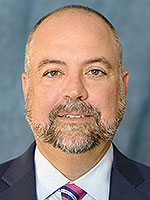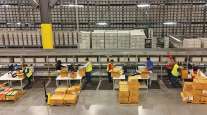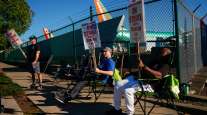Senior Reporter
Economy Recovering, but Experts Fear Rise in Coronavirus Cases

[Ensure you have all the info you need in these unprecedented times. Subscribe now.]
Experts are warning that signs of improvement in the U.S. economy could give way to another round of contractions, as a rising tide of coronavirus cases in certain states threatens to have a similarly chilling effect as to what occurred during the earlier months of the pandemic.
“Things have changed, and thinking that by October, November, the economy will be back to the same level it was at before the pandemic — you have to be a super optimist,” said Rajeev Dhawan, the director of the Economic Forecasting Center at Georgia State University, during an interview with Transport Topics Radio. “Until there is a vaccine or a medical treatment, you have to keep on waiting for a full recovery.”
Dhawan said the U.S. economy was spared a deeper recession due to trillions of dollars in federal spending to extend unemployment benefits, as well as other government programs to keep credit markets liquid. But with many of those programs set to expire in late July, Dhawan worries that another infusion of spending may be necessary to stave off further economic damage.

Dhawan
“It looks like we reached some kind of a bottom [in May], but that may be artificial, because we have so many fiscal programs going, and that’s giving support to the economy, small businesses and retail,” he said. “We borrowed ourselves some breathing space for two, three months, but will start to run out of that space by early August.”
On June 25, the Commerce Department issued a revised estimate that indicated the nation’s gross domestic product shrank at an annualized rate of 5% in the first quarter, slightly higher than its 4.8% estimate from April. The same day, the Labor Department said 1.48 million workers filed new unemployment applications during the third week in June. That brings the number of workers who have sought jobless benefits in the past 14 weeks up to 47.1 million.
According to the Johns Hopkins Coronavirus Resource Center, several states with significant population centers, including California, Florida, Georgia, Texas and Arizona are reporting substantial increases in coronavirus cases, causing fears that the economies in those states may be damaged. Three of the four — Texas, Arizona, and Florida — were among the earliest to reopen in May.
In Texas, Gov. Greg Abbott on June 25 paused further efforts to re-open the state amid the increase. While businesses that were permitted to open under the previous phases can continue to operate under designated guidelines, Abbott said, “As we experience an increase in both positive COVID-19 cases and hospitalizations, we are focused on strategies that slow the spread of this virus while also allowing Texans to continue earning a paycheck to support their families. The last thing we want to do as a state is go backwards and close down businesses.”
On June 24, the governors of New York, New Jersey and Connecticut said they would implement a mandatory 14-day quarantine on visitors from states where there are coronavirus hot spots.
RELATED: How the Coronavirus Pandemic Might Reshape Trucking’s Future
“We need to do things right inside our four walls in our respective states,” New Jersey Gov. Phil Murphy said at a news conference with New York’s Andrew Cuomo and Connecticut’s Ned Lamont. “The last thing we need to do right now is subject our folks to another round.”
FTR Intel Vice President Avery Vise said too much uncertainty remains to make firm predictions on how the economy will perform this summer if COVID-19 cases increase.
“It is something we are definitely watching. Our concern is going to be if the fatality and hospitalization side goes up,” he said. “Frankly, all bets are off if that happens. Almost every forecast out there is based on the presumption that this period from March through potentially June will be the worst of it, and there will be gradual recovery.”

Costello
American Trucking Associations Chief Economist Bob Costello told TT that while the economy is improving, he fears the increasing number of cases could derail it and create a W-shaped recovery, in which things begin improving but then deteriorate as more people become infected, causing governors and other officials to order businesses closed.
“We’re opening up, and there is more demand, but we are on a trajectory that we’re going right back to our all-time highs — that happened in early April,” Costello said. “What happens then, do we have to shut it all down again? This makes me concerned. We may get a short-term boost, but it could come to a grinding halt again.”
Want more news? Listen to today's daily briefing:
Subscribe: Apple Podcasts | Spotify | Amazon Alexa | Google Assistant | More




